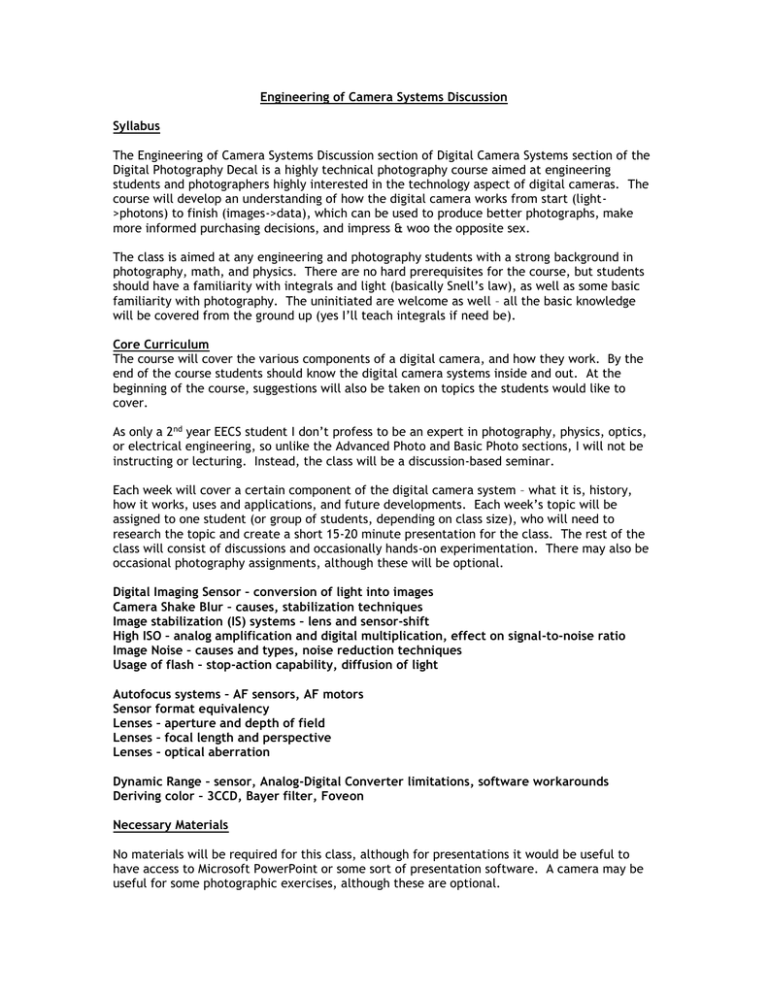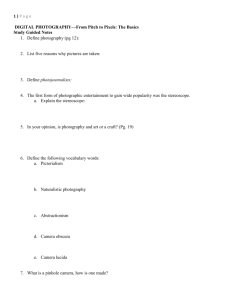Photo for Engineers
advertisement

Engineering of Camera Systems Discussion Syllabus The Engineering of Camera Systems Discussion section of Digital Camera Systems section of the Digital Photography Decal is a highly technical photography course aimed at engineering students and photographers highly interested in the technology aspect of digital cameras. The course will develop an understanding of how the digital camera works from start (light>photons) to finish (images->data), which can be used to produce better photographs, make more informed purchasing decisions, and impress & woo the opposite sex. The class is aimed at any engineering and photography students with a strong background in photography, math, and physics. There are no hard prerequisites for the course, but students should have a familiarity with integrals and light (basically Snell’s law), as well as some basic familiarity with photography. The uninitiated are welcome as well – all the basic knowledge will be covered from the ground up (yes I’ll teach integrals if need be). Core Curriculum The course will cover the various components of a digital camera, and how they work. By the end of the course students should know the digital camera systems inside and out. At the beginning of the course, suggestions will also be taken on topics the students would like to cover. As only a 2nd year EECS student I don’t profess to be an expert in photography, physics, optics, or electrical engineering, so unlike the Advanced Photo and Basic Photo sections, I will not be instructing or lecturing. Instead, the class will be a discussion-based seminar. Each week will cover a certain component of the digital camera system – what it is, history, how it works, uses and applications, and future developments. Each week’s topic will be assigned to one student (or group of students, depending on class size), who will need to research the topic and create a short 15-20 minute presentation for the class. The rest of the class will consist of discussions and occasionally hands-on experimentation. There may also be occasional photography assignments, although these will be optional. Digital Imaging Sensor – conversion of light into images Camera Shake Blur – causes, stabilization techniques Image stabilization (IS) systems – lens and sensor-shift High ISO – analog amplification and digital multiplication, effect on signal-to-noise ratio Image Noise – causes and types, noise reduction techniques Usage of flash – stop-action capability, diffusion of light Autofocus systems – AF sensors, AF motors Sensor format equivalency Lenses – aperture and depth of field Lenses – focal length and perspective Lenses – optical aberration Dynamic Range – sensor, Analog-Digital Converter limitations, software workarounds Deriving color – 3CCD, Bayer filter, Foveon Necessary Materials No materials will be required for this class, although for presentations it would be useful to have access to Microsoft PowerPoint or some sort of presentation software. A camera may be useful for some photographic exercises, although these are optional. Grading Every student (or group of students) will be assigned a topic to research and present for a specific week. The Pass/No Pass grade is based on the completion of this presentation. Course Schedule As the course will almost completely be defined by topics students are interested in, there is no set schedule. The material should approximately cover the material defined above in the core curriculum.

